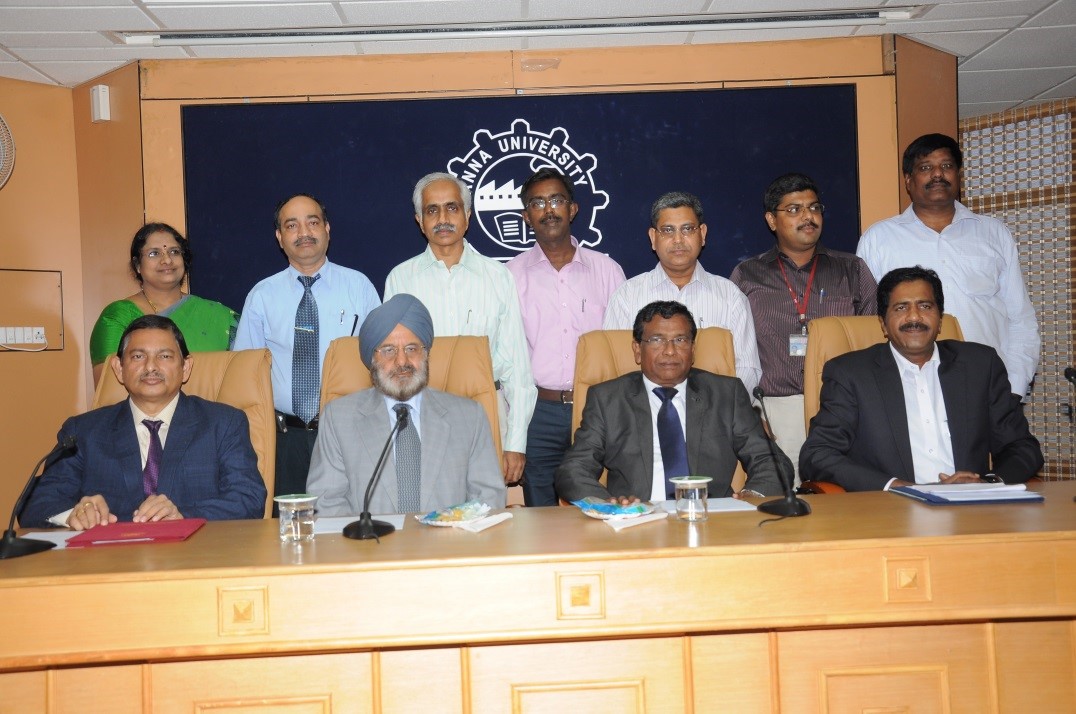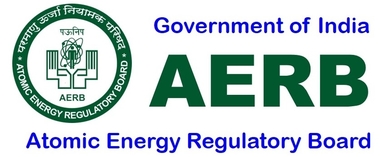Academic Outreach
SRI maintained academic interactions with several institutions through collaborative research. A memorandum of understanding with Anna University was signed to undertake projects for mutual benefits. Theme meetings, training courses and workshops were organized with wide participation both from within and outside DAE. Lectures and invited talks were delivered at premier academic institutions such as IITs. Colloquiums were arranged periodically to share and exchange new research ideas and visits by eminent scientists provided encouragement to take up challenging activities. The groundbreaking ceremony for the construction of SRI Engineering Hall to conduct safety significant experiments was performed on 28th Aug, 2014.
Atomic Energy Regulatory Board signs memorandum of understanding with Anna University, Chennai for research collaborations
To promote and develop cooperation and synergy in mutually beneficial areas of research related to regulatory aspects of nuclear facilities and to enhance collaborative research with academic institutions, Atomic Energy Regulatory Board (AERB) signed a Memorandum of Understanding (MoU) with Anna University (AU), Chennai. The MoU was signed by Secretary, AERB and Registrar, AU on May 21, 2013 in Chennai in the presence of Chairman, AERB and Vice-Chancellor, AU.

(L to R sitting) Shri R. Bhattacharya, Secretary, AERB, Shri S. S. Bajaj, Chairman, AERB, Prof. Dr. P. Kaliraj, Vice-Chancellor, AU and Dr. S. Sivanesan, Registrar, AU MoU with senior officials of AU and Safety Research Institute, Kalpakkam
The MoU is aimed to promote joint activities between AERB and AU with a view to accelerate the pace of research in advanced and challenging areas of nuclear science and technology. Mutual benefits that accrue from the interactions include time bound applied research, enhanced professional skills, and opportunities for students to work in cutting areas of research in science and technology.
The generic areas of collaborative research include, but are not limited to, Reliability Engineering, Physics, Environmental and Geographical Information Sciences, Remote Sensing, Thermal hydraulics, Structural Mechanics, Disaster Mitigation and Management etc. The MoU facilitates sharing of infrastructural resources, promote scholarly activities and provide opportunity for researchers / doctoral students of AU leading to strengthening of research activities at Safety Research Institute, the regulatory research wing of AERB located at Kalpakkam. The MoU will enhance academic interactions bringing the vision of establishing academic and institutional collaboration closer to fruition in regulatory research activities.
Research Scholars
SRI-AERB has been providing project work and guidance to students and research scholars in science and engineering in the area of reactor physics, structural analysis, PSA and reliability, computational fluid dynamics, fire modeling, ground water flow and radionuclide migration etc. During the period, SRI Officers have guided research scholars and students on the following projects:
- Guidance was provided to Trainee officers from the BARC training school at IGCAR, for the following project works;
- Numerical Studies of Hydrogen Distribution in BWR Mark–I Containment.
- Numerical Studies on Hydraulic Transients during Pump Startup and coast down in an Adiabatic Closed Loop System
- Degradation of Hydrazine in aqueous streams by using Advance Oxidation Methods
- Treatment of degradation products of TBP by using Advanced Oxidation Processes
- Uncontrolled withdrawal of a CSR in PFBR
- Analysis of critical experimental benchmarks by deterministic method
- Application of Chernick model for estimation of reactivity due to load transients in a thermal reactor
- Guidance was provided to MSc (Physics) students of Calicut University, Kerala for the following dissertation project works;
- Efficiency calibration of High Pure Germanium Detector
- Efficiency calibration of Sodium Iodide Scintillation Detector
- Expert guidance and technical advice was provided to HBNI Research Scholar, IGCAR for Ph.D. research work on “Development & application of PSA methodologies for estimating risk associated with nuclear systems & facilities”.







